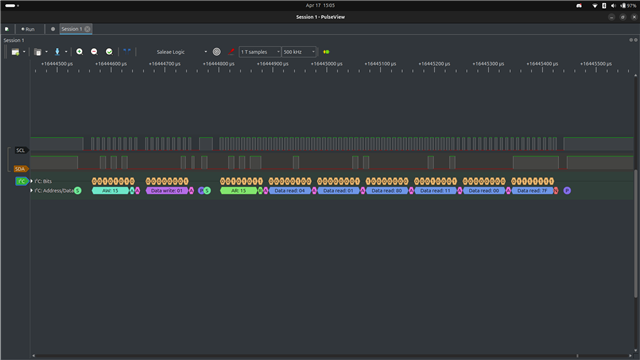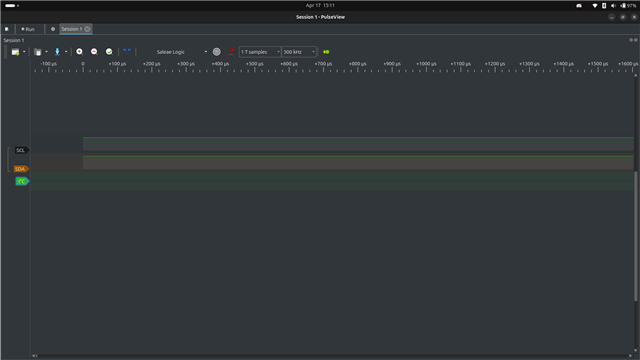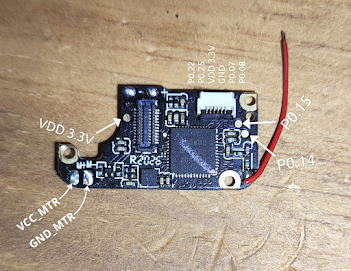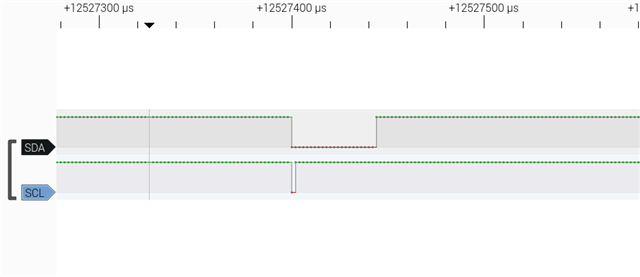I have problem with i2c that can't read the cst816s, its always return log message `<err> cst816s: failed reading chip id` and `<err> cst816s: Could not read x data` when touched. i'm using the nRF52832. is there any configuration i need to do?
the board device tree:
/dts-v1/;
#include <nordic/nrf52832_qfaa.dtsi>
...
&flash0 {
partitions {
compatible = "fixed-partitions";
#address-cells = <1>;
#size-cells = <1>;
boot_partition: partition@0 {
label = "mcuboot";
reg = <0x00000000 DT_SIZE_K(48)>;
};
slot0_partition: partition@c000 {
label = "image-0";
reg = <0x0000c000 DT_SIZE_K(220)>;
};
slot1_partition: partition@43000 {
label = "image-1";
reg = <0x00043000 DT_SIZE_K(220)>;
};
storage_partition: partition@7a000 {
label = "storage";
reg = <0x0007a000 DT_SIZE_K(24)>;
};
};
};
&gpio0 {
status = "okay";
};
&gpiote {
status = "okay";
};
&rtc2 {
status = "okay";
};
&uart0 {
status = "okay";
pinctrl-0 = <&uart0_default>;
pinctrl-1 = <&uart0_sleep>;
pinctrl-names = "default", "sleep";
current-speed = <115200>;
};
&i2c1 {
status = "okay";
pinctrl-0 = <&i2c1_default>;
pinctrl-1 = <&i2c1_sleep>;
pinctrl-names = "default", "sleep";
};
the pinctrl file:
&pinctrl {
uart0_default: uart0_default {
group1 {
psels = <NRF_PSEL(UART_TX, 0, 24)>, <NRF_PSEL(UART_RX, 0, 23)>;
};
};
uart0_sleep: uart0_sleep {
group1 {
psels = <NRF_PSEL(UART_TX, 0, 24)>, <NRF_PSEL(UART_RX, 0, 23)>;
low-power-enable;
};
};
spi0_default: spi0_default {
group1 {
psels = <NRF_PSEL(SPIM_MOSI, 0, 29)>, <NRF_PSEL(SPIM_SCK, 0, 28)>;
};
};
spi0_sleep: spi0_sleep {
group1 {
psels = <NRF_PSEL(SPIM_MOSI, 0, 29)>, <NRF_PSEL(SPIM_SCK, 0, 28)>;
low-power-enable;
};
};
i2c1_sleep: i2c1_sleep {
group1 {
psels = <NRF_PSEL(TWIM_SDA, 0, 9)>, <NRF_PSEL(TWIM_SCL, 0, 10)>;
low-power-enable;
};
};
i2c1_default: i2c1_default {
group1 {
psels = <NRF_PSEL(TWIM_SDA, 0, 9)>, <NRF_PSEL(TWIM_SCL, 0, 10)>;
};
};
};
the overlay file:
/ {
chosen {
zephyr,display = &display;
zephyr,keyboard-scan = &touch_screen;
};
aliases {
input = &touch_screen;
};
leds {
compatible = "gpio-leds";
lcd_backlight: lcd_backlight {
gpios = <&gpio0 11 GPIO_ACTIVE_LOW>;
label = "LCD Backlight";
};
};
lvgl_pointer_input:lvgl_pointer {
compatible = "zephyr,lvgl-pointer-input";
input = <&touch_screen>;
};
};
&spi0 {
compatible = "nordic,nrf-spim";
status = "okay";
pinctrl-0 = <&spi0_default>;
pinctrl-1 = <&spi0_sleep>;
pinctrl-names = "default", "sleep";
cs-gpios = <&gpio0 30 GPIO_ACTIVE_LOW>;
display: st7789v@0 {
label = "ST7789 Display";
compatible = "sitronix,st7789v";
spi-max-frequency = <20000000>;
reg = <0>;
cmd-data-gpios = < &gpio0 27 GPIO_ACTIVE_LOW>;
reset-gpios = < &gpio0 31 GPIO_ACTIVE_LOW>;
width = <240>;
height = <240>;
x-offset = <0>;
y-offset = <0>;
vcom = <0x19>;
gctrl = <0x35>;
vrhs = <0x12>;
vdvs = <0x20>;
mdac = <0x00>;
gamma = <0x01>;
colmod = <0x05>;
lcm = <0x2c>;
porch-param = [0c 0c 00 33 33];
cmd2en-param = [5a 69 02 01];
pwctrl1-param = [a4 a1];
pvgam-param = [D0 04 0D 11 13 2B 3F 54 4C 18 0D 0B 1F 23];
nvgam-param = [D0 04 0C 11 13 2C 3F 44 51 2F 1F 1F 20 23];
ram-param = [00 F0];
rgb-param = [CD 08 14];
};
};
&i2c1 {
clock-frequency = <I2C_BITRATE_FAST>;
touch_screen: cst186s@15 {
label = "CST816S Touch Screen";
status = "okay";
compatible = "hynitron,cst816s";
reg = <0x15>;
irq-gpios = <&gpio0 26 GPIO_ACTIVE_LOW>;
rst-gpios = <&gpio0 21 GPIO_ACTIVE_LOW>;
};
};




